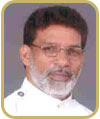Beyond Names and Forms:
Truth, goodness and sanctity are not monopolies of one religion. The aim of every religion is to promote goodness among individuals and in the society.
At the 1893 session of the World Parliament of Religions in Chicago, Swami Vivekananda remarked:
“If the World Parliament of Religions has shown anything to the world, it is this: it has proved to the world that holiness, purity and charity are not exclusive possessions of any church in the world, and that every system has produced men and women of the most exalted character. In the face of this evidence, if anybody dreams of the exclusive survival of his own religion and the destruction of others, I pity him from the bottom of my heart and point out to him that upon the banner of every religion will soon be written, in spite of his resistance: “Help and not fight, assimilation and not destruction, peace and not dissension.””
Every believer should try to seek and find God’s revelation and presence, his power and grace in other religions; a search which helps the seeker to situate himself/herself among the genuine seekers of other religious traditions and which helps him/her to engage in a common spiritual practice to deepen his/her life in God. This spirituality, besides being a help for personal sanctity, also promotes peace, harmony and a sense of universal brotherhood in the world. It tries to encourage the common endeavour of all religions to discover God’s goodness manifested through different people, in different scriptures and in different genuine religious traditions.
Truth, goodness and sanctity are not monopolies of one religion. The aim of every religion is to promote goodness among individuals and in the society and to lead its faithful to the absolute eschatological goodness. The most basic moral teaching of all religions is the same. This does not in any way suggest that all religions are the same. The content of the faith transmitted through scriptures, traditions and official teachings of each religion have to be different and the commitment to this faith is to be irrevocable. However, in the practice of religious faith in society, followers of different faiths find themselves on a common platform exercising the same moral and ethical principles.
Ever since the Asian religious traditions came into contact with the Western world, there has been mutual interaction between them, leading, today, to a growing recognition that the riches they contain are a common inheritance of the total human community, and are not meant only for particular communities. Today, there are attempts to go even further, to see whether one can enter into each other’s spiritual worlds and learn spiritual practices that are part of other religious traditions. We have to cross barriers and undertake spiritual pilgrimages to other religious traditions and strengthen universal brotherhood among all humanity.
The pressure to understand the total spiritual heritage of all humanity as the common heritage of all people everywhere will increase in the years ahead of us. Whatever comes of the search for dialogue between spiritual traditions, the search for spiritual growth and maturity will continue to inspire us to find life and meaning beyond names and forms. The verses from this prayer of Rabindranath Tagore’s Gitanjali in some ways echo the longing of every human heart:
“Give me strength lightly to bear my joys and sorrows
Give me strength to make my love fruitful in service
Give me strength to raise my mind high above daily trifles
And give me the strength to surrender my strength to Thy Will with love.”
(Rev. MM Abraham, a priest of the Mar Thoma Church, is Associate Director of the Hyderabad-based Henry Martyn Institute, a centre that seeks to promote dialogue between people of different faiths)


COMMENTS